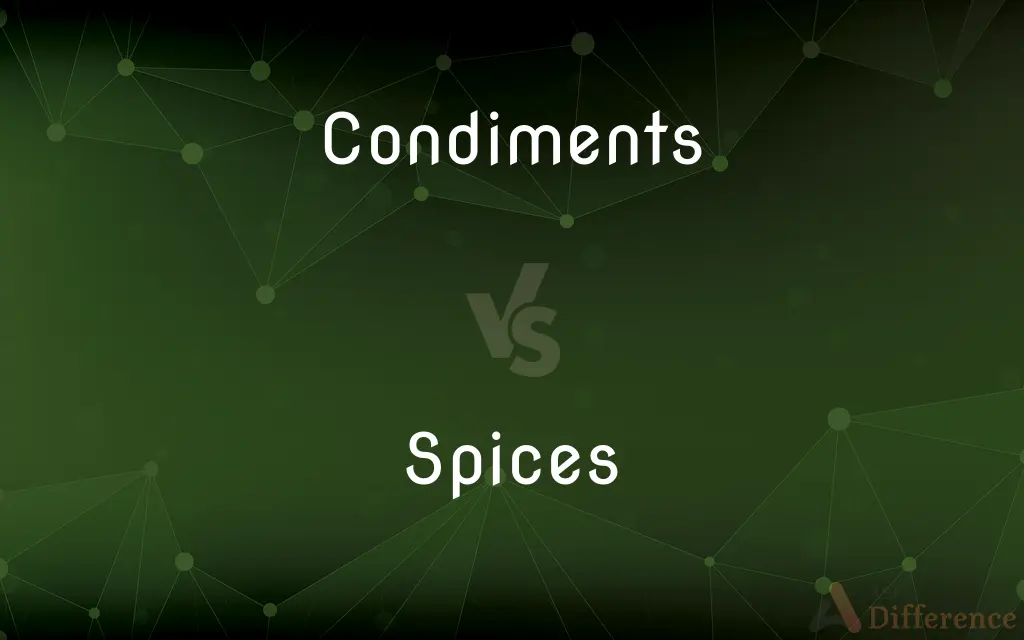Condiments vs. Spices — What's the Difference?
By Tayyaba Rehman — Published on October 24, 2023
Condiments are sauces or spreads added to food for flavor, while spices are aromatic substances, usually derived from plants, used to season food.

Difference Between Condiments and Spices
Table of Contents
ADVERTISEMENT
Key Differences
Condiments typically come in liquid, paste, or spreadable form, used as accompaniments to dishes to enhance or complement their flavors. Spices, conversely, are typically dry and originate from various parts of plants, like seeds, bark, or roots, and primarily season or add aroma to meals.
While ketchup, mustard, and mayonnaise are familiar examples of condiments, spices bring to mind substances like cinnamon, black pepper, and turmeric. Condiments usually act as a side or topping, whereas spices get mixed into the dish during its preparation or cooking process.
In culinary practices, condiments are frequently added after the cooking process or served on the side for individuals to apply based on preference. Spices, in contrast, are more often than not integrated during the cooking procedure, fusing with other ingredients to produce distinct flavors and aromas.
From a preservation perspective, condiments like pickles or relishes can help in prolonging the shelf life of certain foods. Spices, with their antiseptic qualities, have historically been used not just for flavoring but also for preserving food, especially in regions with warmer climates.
The versatility of condiments is evident in the global varieties available, from soy sauce in Asian cuisine to guacamole in Mexican dishes. Similarly, spices, with their origins in ancient trade routes, have transcended boundaries, with spices like cumin or cardamom now integral in diverse cuisines worldwide.
ADVERTISEMENT
Comparison Chart
Nature
Liquid, paste, or spreadable.
Typically dry.
Derived From
Various sources, often vegetable-based.
Parts of plants (e.g., seeds, bark).
Use in Cooking
Added post-cooking or served on the side.
Incorporated during cooking.
Preservation Purpose
Enhance shelf life of foods.
Flavoring and preservation.
Examples
Ketchup, mustard.
Cinnamon, black pepper.
Compare with Definitions
Condiments
Sauces or spreads used to complement or enhance food flavors.
Ketchup and mustard are popular condiments for hotdogs.
Spices
Natural substances that provide aroma and flavor to recipes.
Spices like turmeric and saffron give vibrant colors to dishes.
Condiments
Accompaniments often added to food post-cooking.
Salsa and guacamole are favorite condiments for tortilla chips.
Spices
Aromatic substances used to season and flavor foods.
Cinnamon and nutmeg are spices popular in baking.
Condiments
Edible substances added to dishes to improve or modify taste.
Mayonnaise is one of the condiments I always have in my fridge.
Spices
Dry ingredients derived from plants to enhance food taste.
I added a mix of spices to the curry for an authentic taste.
Condiments
Flavor-enhancing substances that can be liquid, solid, or semi-solid.
I love adding various condiments to my sandwiches for extra zest.
Spices
Ground or whole plant products used in cooking.
The meat was marinated with a blend of spices overnight.
Condiments
Products that elevate or contrast a dish's natural flavors.
Asian cuisines often come with a range of condiments to choose from.
Spices
Edible additions that impact a dish's taste and fragrance.
The stew's delicious aroma came from the array of spices used.
Condiments
A substance, such as a relish, vinegar, or spice, used to flavor or complement food.
Spices
Any of various pungent, aromatic plant substances, such as cinnamon or nutmeg, used to flavor foods or beverages.
Condiments
Plural of condiment
Spices
These substances considered as a group.
Spices
Something that adds zest or interest
The controversy added spice to the political campaign.
Spices
A pungent aroma.
Spices
To season with spices.
Spices
To add zest or interest to
Uses witty rhymes to spice up the song.
Spices
Plural of spice
Common Curiosities
Do condiments have a preservation purpose?
Yes, some condiments, like pickles, help in preserving food.
Are all spices hot or spicy?
No, spices can be mild or aromatic, not necessarily hot.
Are spices always dry?
While most spices are dry, some, like fresh ginger or garlic, can be fresh.
Do spices have health benefits?
Many spices, like turmeric and ginger, are believed to offer health benefits.
Are condiments always liquid?
No, condiments can be liquid, paste, or spreadable.
Can condiments be made from spices?
Yes, some condiments incorporate spices for flavor, like spicy mustard.
Why are spices important in cooking?
Spices add flavor, aroma, and can influence the color and overall appeal of a dish.
Is salt considered a spice?
While used like a spice, salt is technically a mineral, not a spice.
Which has a stronger flavor impact: condiments or spices?
Both can be potent, but it depends on the specific condiment or spice and its use.
What's the most common condiment in America?
Ketchup is among the most widely used condiments in America.
How are condiments typically stored?
Most condiments are stored in a cool place or refrigerated after opening.
Can condiments be homemade?
Yes, many people make homemade condiments like ketchup, mayo, or salsa.
Do spices have an expiration date?
While spices don't spoil in the same way fresh food does, they can lose potency over time.
Which cuisine uses a lot of spices in its dishes?
Many cuisines use spices extensively, with Indian cuisine being notably spice-rich.
Where are spices primarily derived from?
Spices come from various plant parts, including seeds, bark, stems, and roots.
Share Your Discovery

Previous Comparison
Cooking Oil vs. Vegetable Oil
Next Comparison
Water Vapor vs. SteamAuthor Spotlight
Written by
Tayyaba RehmanTayyaba Rehman is a distinguished writer, currently serving as a primary contributor to askdifference.com. As a researcher in semantics and etymology, Tayyaba's passion for the complexity of languages and their distinctions has found a perfect home on the platform. Tayyaba delves into the intricacies of language, distinguishing between commonly confused words and phrases, thereby providing clarity for readers worldwide.











































